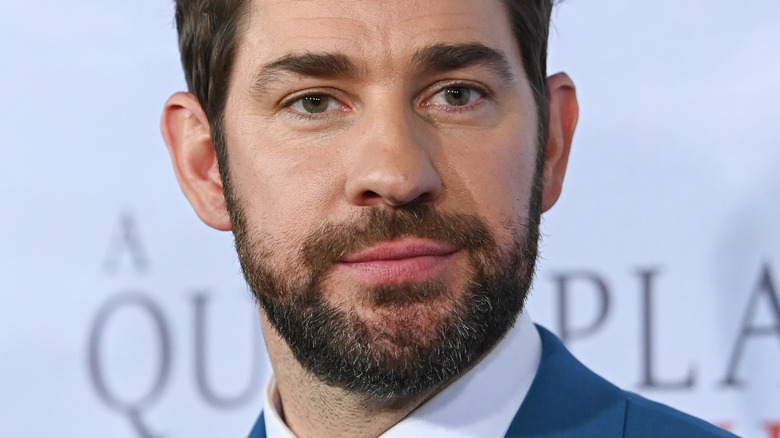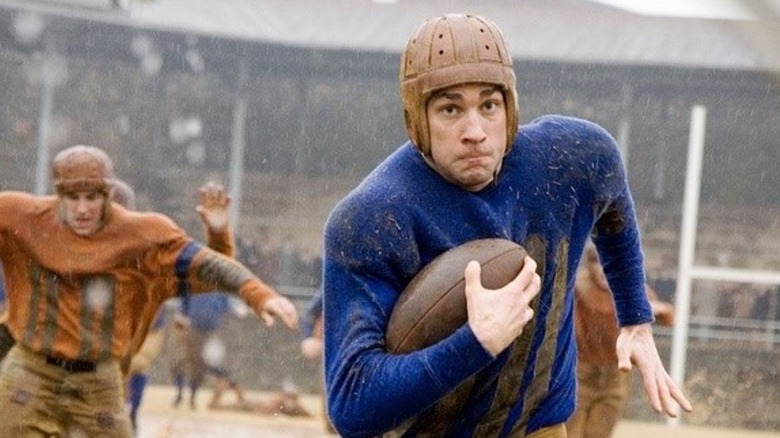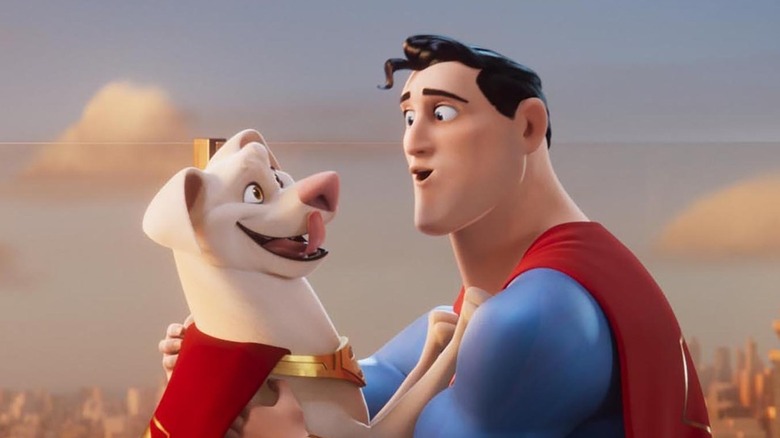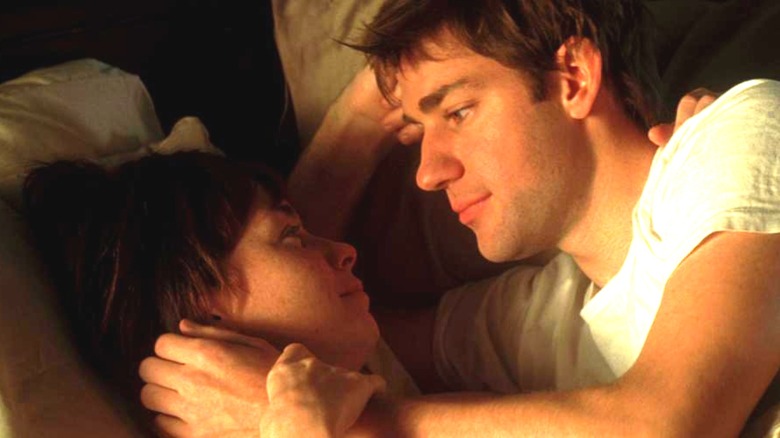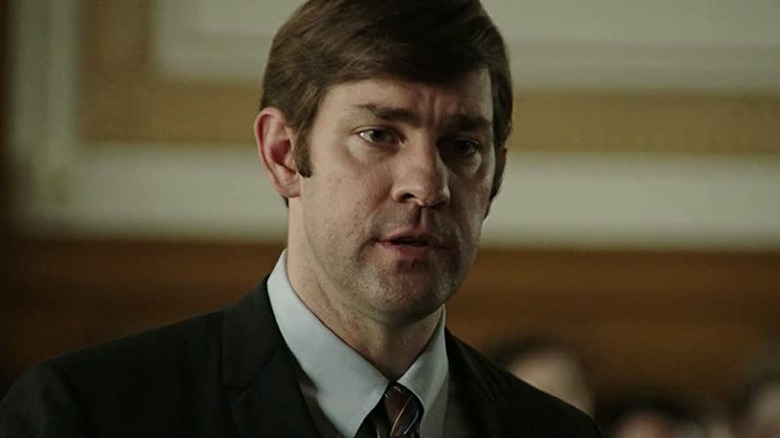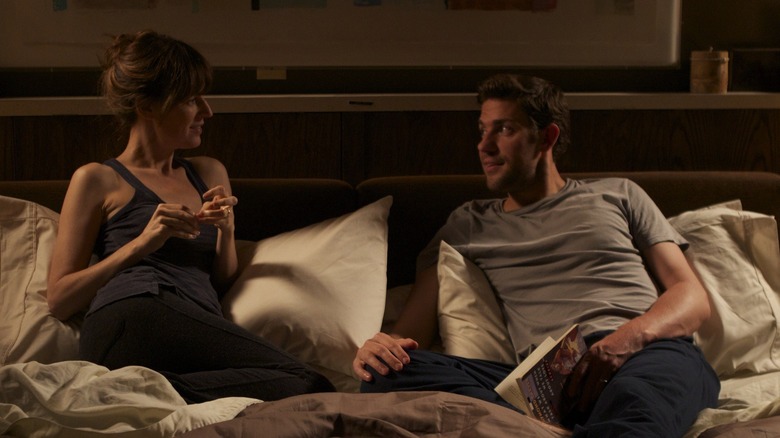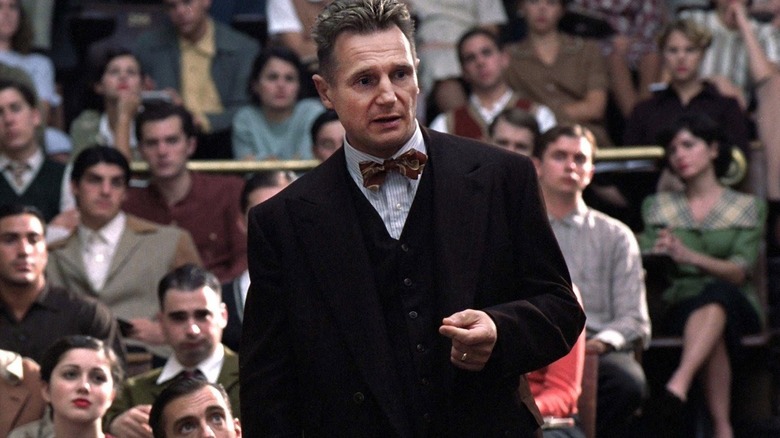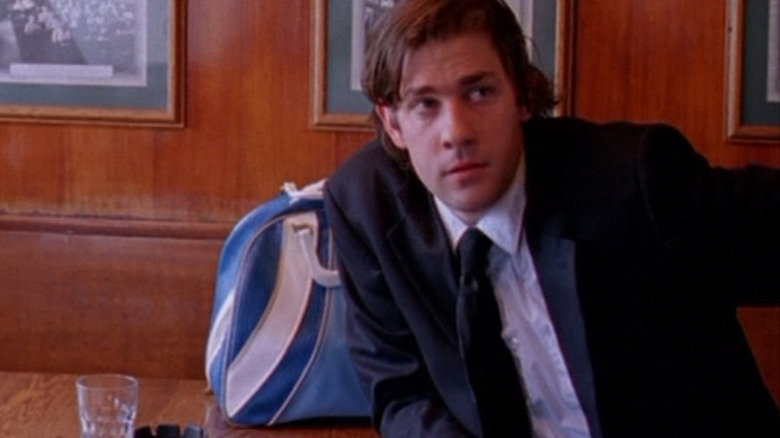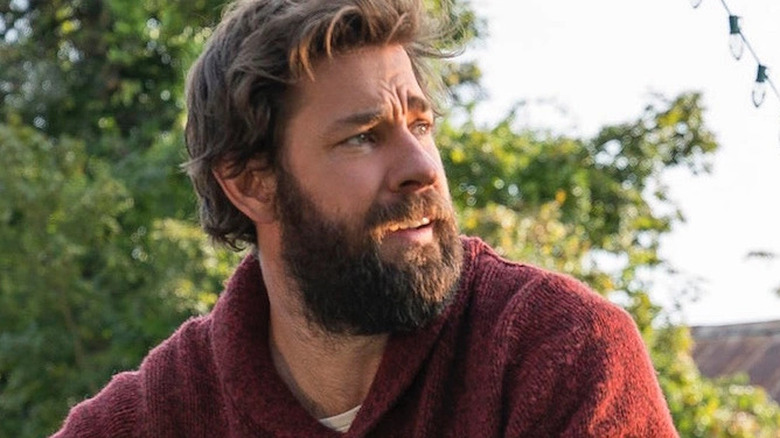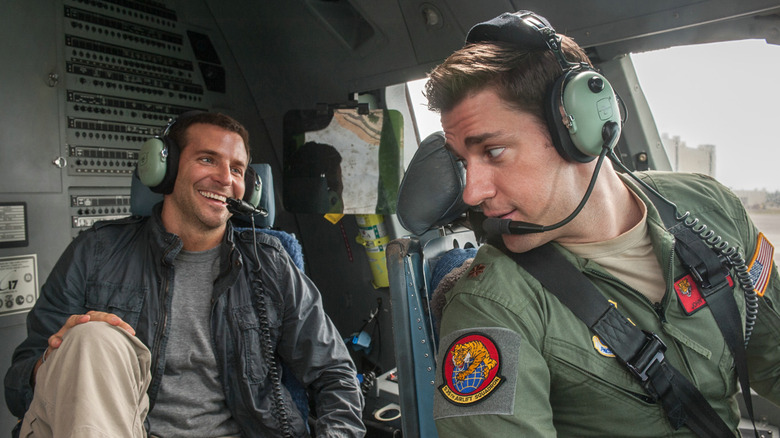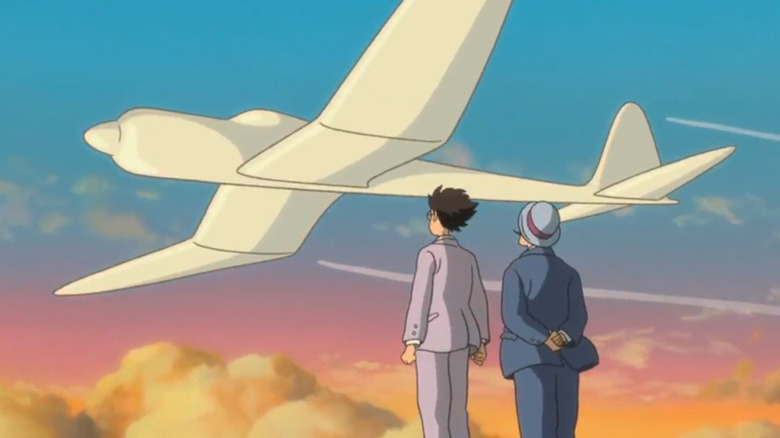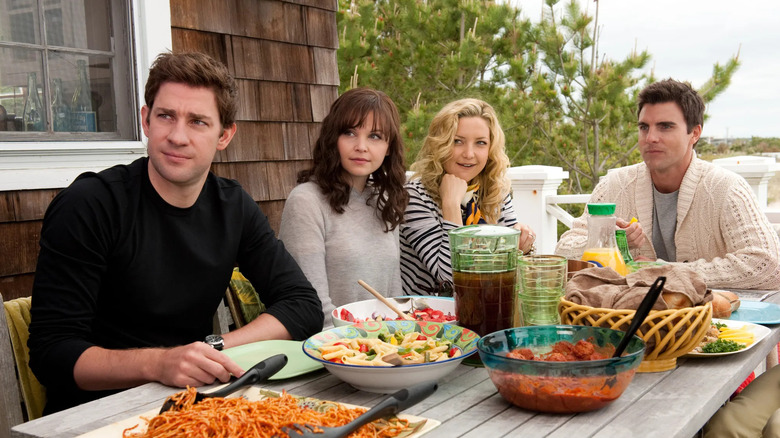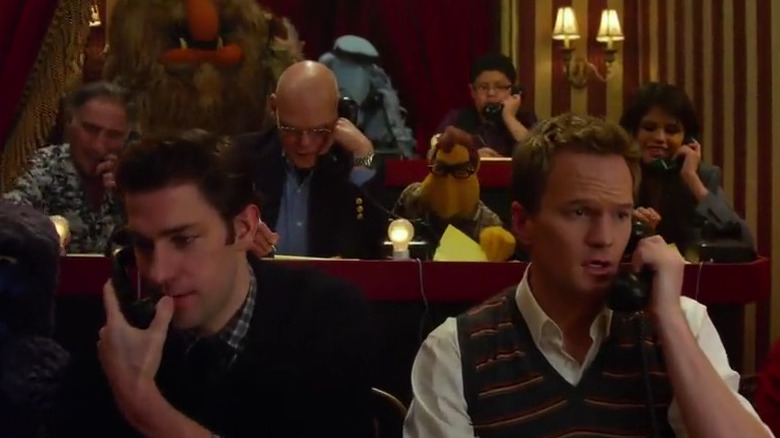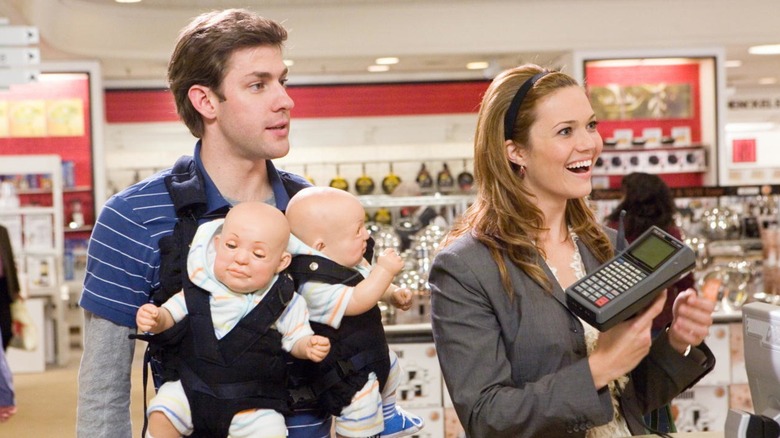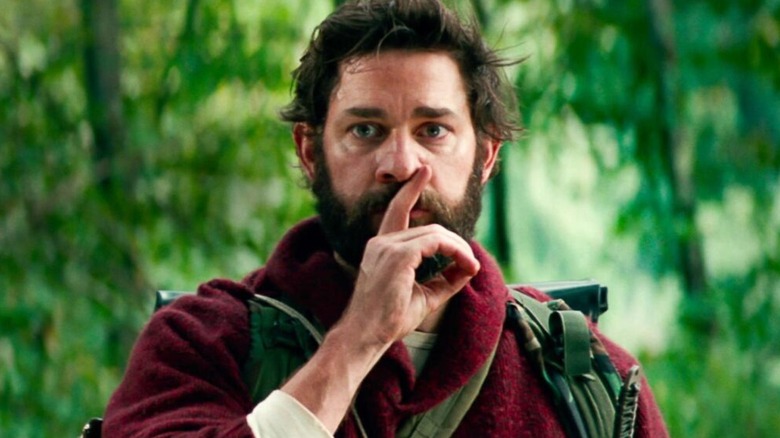The 7 Best And 7 Worst John Krasinski Movies Ranked
John Krasinski can write, direct, act, and produce. In a Hollywood landscape where being that much of a dynamic creative force is rare, he often takes full advantage of his breadth. He has a penchant for dramatic roles, but also possesses a sharp on-screen wit that often blossoms into scene-stealing charisma. On top of a still-growing filmography that sweeps across many genres from romantic comedy to horror, Krasinski has gained plenty of awards recognition, taking home two Critics' Choice awards and two Screen Actors Guild awards.
Before landing his breakout role as Jim Halpert on NBC's "The Office," John Krasinski was a Boston kid-turned-Brown University graduate scoring bit roles in movies. But after spending years as a fan favorite on a beloved sitcom and accumulating starring or supporting turns in big studio features, Krasinski finally became a household name in the 2010s. Now he stars as the titular CIA analyst on "Jack Ryan" and continues proving himself a multitalented filmmaker with the "A Quiet Place" movies.
Like every actor who's spent a big part of their career balancing sitcoms and romantic comedy roles, Krasinski has appeared in many great films, but his resume isn't free of the occasional flop. Here are some of the best movies John Krasinski has been featured in, as well as some of the worst movies he's been unlucky enough to work on (including some you've probably never heard of).
Worst: Leatherheads
In 2008, "The Office" was one of primetime television's most popular sitcoms. Krasinski, along with his castmates, won a Screen Actors Guild Award that year for Outstanding Performance by an Ensemble in a Comedy Series. On the silver screen, however, his lone film credit for '08 was in George Clooney's lackluster pre-NFL football comedy "Leatherheads."
The film, based loosely on the Chicago Bears signing Harold "Red" Grange from the University of Illinois in 1925, tracks Duluth Bulldogs captain Dodge Connolly's (Clooney) mission to make pro football exciting. Star Princeton University fullback and touted World War I hero Carter Rutherford (Krasinski), a fictional re-imagining of Grange, is the first man to join Connolly's squad. A love triangle soon unfolds among Connolly, Rutherford, and Chicago Tribune reporter Lexie Littleton (Renée Zellweger). Meanwhile, Littleton tries to prove that Rutherford's war heroics were falsified, and a couple of meatheads attempt to save a struggling league in pre-Great Depression America.
It's a football movie that isn't really about football, and critics were quick to diagnose that this identity crisis was what ushered "Leatherheads" into flop territory. Clooney and Krasinski haven't collaborated together again since, and, just as Clooney would go on to direct better films (like "The Ides of March"), Krasinski's best years on film were still ahead of him.
Best: DC League of Super-Pets
On top of his starring role on Amazon Studios' "Jack Ryan," Krasinski entered the 2020s with a run of action flicks. After doing cameos in "Free Guy" and "Doctor Strange in the Multiverse of Madness," the actor's pivot toward high-energy, blockbuster features has culminated in the DC Comics animated film "DC League of Super-Pets." Co-starring alongside Dwayne Johnson, Kevin Hart and Kate McKinnon, Krasinski voices Superman.
When Superman and the rest of the Justice League are kidnapped, Krypto the Super-Dog (Johnson) assembles a battalion of misfit superhero animals to rescue the missing caped crusaders. Capitalizing on the DC Comics cinematic renaissance set forth by dramas "Joker" and "The Batman," "League of Super-Pets" is a breath of comedic fresh air that moves the focus away from the crimefighters we're accustomed to. The writing is smart, Krasinski and the whole crew give wonderful voice performances, and the end product is a laugh-out-loud riot.
Worst: Brief Interviews with Hideous Men
By 2009, Krasinski had honed his acting charisma after a few years of commanding the screen and stealing "The Office" scenes, and decided to try his hand behind the camera for "Brief Interviews with Hideous Men." In his directorial debut, Krasinski brings David Foster Wallace's short story collection of the same name to life, but doesn't quite capture the book's depth.
Krasinski surrounded star Julianne Nicholson with a strong ensemble comprised of Josh Charles, Christopher Meloni, Will Arnett, and Timothy Hutton, among others, but the plot they all navigate is a sluggish pastiche of interviews, character sketches, and confessions. Sara Quinn (Nicholson) gets dumped by Ryan (Krasinski) and decides to insert herself into the psyches of 17 other men. As she explores what makes them tick, her investigation gets interwoven with her own life story. Krasinski has since proven that he can write a good screenplay, but as is sometimes the case when shrinking a book down to an 80-minute feature, the film tries to do too much with limited space.
The acting is boisterous and enthusiastic, with Hutton and Meloni's turns being particular highlights, but the narrative is messy and the eponymous men are self-serving and unmoving figures. You can't blame Krasinski for wanting to try having a hand in every cookie jar on a Hollywood feature, but he failed to do the source material proper justice and, unfortunately, it'd take him almost 10 years to finally hit his apex.
Best: Detroit
In Kathryn Bigelow's "Zero Dark Thirty" follow-up "Detroit," the hard-hitting filmmaker tackles the Algiers Motel incident that occurred during Detroit's 12th Street Riot in 1967. The film features a terrific ensemble, including John Boyega, Will Poulter, Jack Reynor, and Hannah Murray. While Krasinski plays a minor role as Attorney Auerbach (a fictional depiction of Norman Lippitt, per Legal News), his portrayal of a Michigan lawyer who's famously won numerous acquittals for cops accused of violence against Black men in Detroit offers a look at the judicial side of the fallout. "Detroit" tracks the riot in its entirety, moving from the inciting club raid all the way to the court proceedings.
Though the film was a box office flop (via Variety), it found some critical success, with reviewers especially praising the performances of Boyega and Poulter, Mark Boal's screenplay and Bigelow's direction. Nowhere near blockbuster potential, reviewers noted that the film's summer release date might've been the cause for its financial floundering. "Detroit" earned an NAACP Image Award for Outstanding Independent Motion Picture.
Worst: Nobody Walks
Ry Russo-Young's third feature film, co-written by Lena Dunham at the height of her stardom, was a critical flop in 2012, clocking in with a 41% Rotten Tomatoes score. With Krasinski in a leading trio alongside Olivia Thirlby and Rosemarie DeWitt, "Nobody Walks" finds Peter (Krasinski) and Julie (DeWitt), a wealthy Silver Lake couple, taking in Martine (Thirlby), a 23-year-old artist trying to complete a film project.
"Nobody Walks" is a soap opera presented as a charming indie flick, as it meanders through themes of seduction, lust, and betrayal. But even by those standards, its attempts at melodrama are hindered by an unredeemably shallow narrative. Russo-Young's direction is solid, but the plot is hollow and dull. Coming off of an ensemble spot in the even worse "Something Borrowed," Krasinski continued his streak of lukewarm roles here and then again later that same year with Gus Van Sant's "Promised Land." Fortunately, some of his best work was still ahead of him.
Best: Kinsey
In his first named and credited role in a feature film, Krasinski plays a minor character, Ben, in Bill Condon's 2004 biopic about sexology pioneer Alfred Charles Kinsey. Though Liam Neeson plays the title role, co-star Laura Linney scored an Oscar nomination for her turn as Clara "Mac" McMillen, Kinsey's lover. The film made a modest showing at the box office, clocking in at just under $17 million worldwide on an $11 million budget, but it garnered praise from critics across the board, and was recognized with a number of nominations during awards season.
"Kinsey" tracks Alfred Kinsey's sexual history, his book "Sexual Behavior in the Human Male" (a landmark scientific investigation of sexual behavior in people), and his life as a sexologist and a professor of biology at Indiana University through interviews and flashbacks. The film tackles sexual history and sexuality in humans with grace, and offers insight into how the Kinsey Scale was formed. Preceding the blockbuster biopics that would come soon after — like "Ray," "Walk the Line," and "The Last King of Scotland" — "Kinsey" rivaled Ron Howard's "A Beautiful Mind," with critics comparing Neeson's performance to Russell Crowe's and lauding the film's clever and subversive story.
Worst: A New Wave
Not long after he landed the star-making role of Jim Halpert on "The Office," Krasinski found himself cast in as a co-lead in Jason Carvey's 2006 debut feature "A New Wave." Despite Krasinski's rising star, the film flew beneath the radar, and landed with audience score on Rotten Tomatoes that clocks in well below its critic score (9% vs. 33%). In this independent crime dramedy, friends Desmond (Andrew Keegan) and Gideon (Krasinski), both down on their luck financially, watch a bunch of old crime movies and decide to rob a bank.
On paper, the idea holds some merit. As the title suggests, Desmond and Gideon are the "new wave" of criminals who are inspired by the glamorous turns from crime cinema's past. But "A New Wave" is an obvious "Reservoir Dogs" rip-off, and a floundering one at that. With lackluster cinematography and a very bad script, it's a wonder that Krasinski was able to piece together a good resume at all after this, given how none of his co-stars here have even sniffed a career as successful as his.
Best: A Quiet Place Part II
Though "A Quiet Place" was one of the best horror films of the 2010s and could have remained a one-off, the sequel expands the terrifying landscape of its predecessor. Like the first installment, "A Quiet Place Part II" was written, produced, and directed by Krasinski, though his character Lee only appears in an opening flashback sequence, because he died near the end of the first film.
The remaining protagonists from "A Quiet Place," the Abbott family, are still navigating through a world populated by blind extraterrestrials with supersonic hearing. Now that they've learned how to survive, they're searching for others. In this new chapter of a horrific future, Krasinski's writing and the lead performances of Emily Blunt, Millicent Simmonds, and Noah Jupe make "A Quiet Place Part II" a chilling and emotional thriller. Krasinski flips the script on the survival genre by putting a family at the center of the type of story that's so often focused on the individual. With a spin-off and another sequel in the pipeline (via Entertainment Weekly), Krasinski has forged a bona fide franchise that has remained consistently scary and effortlessly original.
Worst: Aloha
Cameron Crowe has made really good movies. He wrote "Fast Times at Ridgemont High," and has directed and written "Say Anything," "Jerry Maguire," "Almost Famous," and "Vanilla Sky." But in 2015, nearly four years after "We Bought a Zoo" was hailed as an average family comedy, he made "Aloha," a lifeless romantic comedy starring some of the biggest actors of the millennium: Bradley Cooper, Emma Stone, Rachel McAdams, Bill Murray, and John Krasinski.
"Aloha" follows Brian Gilcrest (Cooper), an ex-Air Force officer, as he returns to Hawaii and oversees the private launch of a satellite weapon. There's a romantic plot and an off-putting affection for the military industrial complex afoot, which do not make for a particularly lovable mix. The script is pretty atrocious, but even worse, it uses an all-white cast to represent Hawaii's dynamic, historical culture. The Media Action Network for Asian Americans leveled accusations of whitewashing against "Aloha," particularly Crowe as director and Stone for playing a character who goes by an Asian last name and is claimed to be one-quarter Chinese and one-quarter Hawaiian (via NPR). Their complaints certainly hold more than enough water to sink this abysmal demerit on Crowe's otherwise hit-heavy resume.
Best: The Wind Rises
You wouldn't have seen Krasinski on the big screen in 2013, but you might have heard his voice in a couple of animated films. After taking a turn as "Frightening" Frank McCay in Pixar's "Monsters University," he landed the role of Kiro Honjo in the English dub of Studio Ghibli's "The Wind Rises." This historical drama was director Hayao Miyazaki's first feature film since "Ponyo," and became the highest-grossing Japanese film in Japan that year (via Japan Today).
"The Wind Rises" follows the story of Jiro Horikoshi (Joseph Gordon-Levitt), a Japanese aircraft designer. Horikoshi was the chief engineer of the Mitsubishi A6M Zero fighter plane that Japan's military used during the Pearl Harbor attack in 1941. Horikoshi regrets making an aircraft used for war, and dreams of creating a beautiful one that's used for a greater good. "The Wind Rises" is a fictional biopic about art and war, but Miyazaki aims to make it about something even greater: love.
The film was nominated for Best Animated Feature at the Academy Awards, and further cemented Miyazaki as one of the all-time great figures in the history of animation. Gordon-Levitt, Krasinski, and Emily Blunt turn in marvelous performances in what was set to be the filmmaker's final bow. Though (as Deadline points out) Miyazaki has declared retirement a few times and may yet return with another masterpiece, "The Wind Rises" serves as a fitting farewell to a long and prosperous career. On the surface, it's Horikoshi's love letter to his time spent in flight, but beneath that, you'll find an artist reflecting on his own accomplishments.
Worst: Something Borrowed
Luke Greenfield's romantic comedy, based on Emily Giffin's novel of the same name, is an abysmal entry in the genre. It didn't help that 2011 saw similar but better films, like "Crazy, Stupid, Love" and "Friends With Benefits," steal the hearts of moviegoers. Though John Krasinski and Kate Hudson give good performances, "Something Borrowed" flops as a lackluster rehash of long-overdone tropes.
The story feels familiar: Rachel (Ginnifer Goodwin), a successful woman and a great friend, is somehow still single but looking for love. When she falls into bed with longtime crush Dex (Colin Egglesfield), who is engaged to her best friend Darcy (Hudson), things get a bit dicey. On top of that, a guy Rachel is seeing, Ethan (Krasinski), is madly in love with her. It's not a love triangle, but a pot of jealousy and desire ready to boil over.
"Something Borrowed" is messy and lifeless, held together only by a couple of solid supporting performances. The New Yorker called the film a "joke-stoked soap opera" with a "bare bones" plot, exemplifying its monotony (via Rotten Tomatoes, where the movie holds an abysmal 15% critic rating). Despite all this, it did actually do decent business, bringing in over $60 million at the box office, nearly doubling its $35 million budget. Giffin wrote a sequel, "Something Blue," that was expected to lay the groundwork for a second film. However, Egglesfield told Showbiz Cheat Sheet that Warner Bros. has shown very little interest in moving forward.
Best: The Muppets
Written by Jason Segel and Nicholas Stoller, director James Bobin's "The Muppets" was one of the most crowd-pleasing films of 2011. Segel, who'd already found success as a writer with "Forgetting Sarah Marshall" in addition to his fan-favorite role on "How I Met Your Mother," was tasked with bringing the Muppets back to the silver screen for the first time since 1999, when they starred in Tim Hill's "Muppets from Space."
In "The Muppets," puppet (and Muppet super-fan) Walter enlists the help of his human brother Gary (Segel) and Gary's girlfriend (Amy Adams) to help reunite Kermit the Frog with the disbanded gang. Giving their quest a ticking clock, the Muppets must put on a show in a desperate bid to save the Muppet Theater from oil barren Tex Richman.
Featuring cameos from Emily Blunt, Jim Parsons, Neil Patrick Harris, Donald Glover, Selena Gomez, and Krasinski (who can be seen among a cadre of the Muppets' famous fans operating phones for their telethon), the star-studded ensemble doesn't bog down Segel's already rich script. The Muppets' star power holds firm, and the result is a charming, electric comedy that doesn't miss a beat. Tom Huddleston put it best for Time Out, when he wrote, "['The Muppets'] is a film bursting at the seams with sheer, unadulterated joy."
Worst: License to Wed
In what Rotten Tomatoes ranks as Krasinski's absolute worst movie, Ken Kwapis' "License to Wed," he plays one-half of a newly engaged couple (alongside Mandy Moore) who must go through a clergyman's (Robin Williams) test before they can marry. Though it earned double its budget back by grossing $70 million, "License to Wed" was a critical flop and a low point on Moore's, Krasinski's, and especially Williams' resumes.
Sadie (Moore) wants to marry the man of her dreams, Ben (Krasinski), in her family's church. Unfortunately, the parish is booked solid for the next two years, except for a date three weeks away. Reverend Frank (Williams) refuses to marry the couple until they attend and complete his prenuptial course, which includes caring for twin robot babies and not engaging in pre-marital sex. The course is Frank's way of making sure all engaged couples have moved beyond the "puppy love" phase and are ready for lifelong union, but what could have been a fun premise falls embarrassingly short and comes off as more than a little gross and creepy.
Krasinski had "The Office" to fall back on, but "License to Wed" was another disappointing notch in Williams' belt in the 2000s. Following the disappointing "RV" and "Man of the Year," he'd found himself in a professional rut, and Kwapis' floundering script did him no favors. You can see the film's ending coming a mile away if you've seen any other rom-coms this millennium, but "License to Wed" was doomed from the jump.
Best: A Quiet Place
Five years after "The Office" ended, Krasinski officially arrived as a true force to be reckoned with at the box office. 2018's "A Quiet Place" became a pinnacle of modern horror films (in what would be a great year for the genre). Alongside Ari Aster's "Hereditary" and Jeff Wadlow's "Truth or Dare," "A Quiet Place" is wholly original and equally as terrifying. The film turns the idea of a creature feature on its head by pitting an intelligent and merciless antagonist against a tough family of survivors.
As Lee, the Abbott family patriarch, Krasinski delivers a career-defining performance in addition to his duties as writer and director. In a world where the monsters can't see but have acute hearing and any sound could spell death, Lee must navigate his wife Evelyn (Emily Blunt) and two children, Regan (Millicent Simmonds) and Marcus (Noah Jupe), through their dystopian reality. Krasinski expertly ratchets up the tension as Lee and Evelyn do everything they can to keep their children safe while also fighting back against the terror that hunts them.
Not only has the film sparked a franchise, it also earned accolades for representation, as Regan is a deaf character played by Simmonds, who is a deaf actor. Critics and audiences alike raved over "A Quiet Place," which delivers unshakable thrills and offers charismatic performances from a talented cast.
